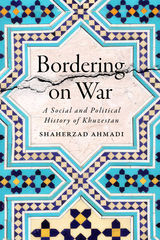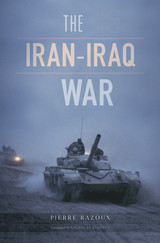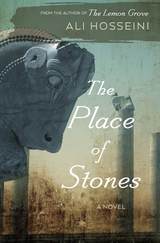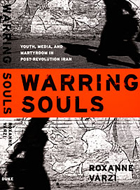
A study of transnational identity, migration, and state loyalties told through the social and political history of Iran’s Khuzestan province.
In 1980, Saddam Hussein’s Ba‘athist forces invaded Khuzestan, one of the oldest and richest provinces in Iran, triggering the Iran-Iraq War. Shaherzad Ahmadi’s Bordering on War examines the social history of Khuzestan and sheds light on how border dwellers, provincial leaders, and migrants in the region shaped Iran and Iraq's history before, during, and after the war.
Drawing from a rich collection of Persian- and Arabic-language archival sources—rarely used by western scholars due to restrictions in Iran—Ahmadi’s research focuses on Arab Iranians and argues that Iranian border dwellers and migrants formed local, non-national loyalties, thereby eschewing bureaucratic pressures to confine loyalties to a single nation-state. The transnational character and ethnically diverse composition of Khuzestan, and especially the oil-rich towns in the southwestern border, led many, including Iraq’s Ba‘ath Party, to question the national belonging of Arab Iranians. Bordering on War contributes to a wider discussion about the ability of individuals and communities to exert agency through migration, trade, education, and other activities.

From 1980 to 1988, Iran and Iraq fought the longest conventional war of the twentieth century. The tragedies included the slaughter of child soldiers, the use of chemical weapons, the striking of civilian shipping in the Gulf, and the destruction of cities. The Iran-Iraq War offers an unflinching look at a conflict seared into the region’s collective memory but little understood in the West. Pierre Razoux shows why this war remains central to understanding Middle Eastern geopolitics, from the deep-rooted distrust between Sunni and Shia Muslims, to Iran’s obsession with nuclear power, to the continuing struggles in Iraq. He provides invaluable keys to decipher Iran’s behavior and internal struggle today.
Razoux’s account is based on unpublished military archives, oral histories, and interviews, as well as audio recordings seized by the U.S. Army detailing Saddam Hussein’s debates with his generals. Tracing the war’s shifting strategies and political dynamics—military operations, the jockeying of opposition forces within each regime, the impact on oil production so essential to both countries—Razoux also looks at the international picture. From the United States and Soviet Union to Israel, Europe, China, and the Arab powers, many nations meddled in this conflict, supporting one side or the other and sometimes switching allegiances.
The Iran-Iraq War answers questions that have puzzled historians. Why did Saddam embark on this expensive, ultimately fruitless conflict? Why did the war last eight years when it could have ended in months? Who, if anyone, was the true winner when so much was lost?

The Place of Stones is Ali Hosseini’s newly translated first novel, his second book to appear in English. In it, he paints a vivid portrait of Sangriz, a village in the southern part of Iran where life has been disrupted by industrialization and the revolution of 1979.
Haydar and Jamal are best friends, and their families have always made their living from the land in the foothills of Iran’s Zagros Mountains. Haydar is a dreamer who searches the hills for an ancient treasure called the Black Globe. Jamal is in love with Haydar’s sister, Golandam, and he attempts to accommodate himself to modernization as a way to create a better life for the two of them. The rapacious conversion of farmland to brick factories draws the trio into escalating conflict with the village landlord.
As Jamal, Haydar, and their families confront land reform, industrialization, revolution, and war, their lives are pulled forcefully toward the explosive events that will change them all. In masterfully crafted prose that never sinks into sentimentality, The Place of Stones illuminates how a lost past continues to shape the present.

Highlighting trends that belie the government’s claim that Islamic values have taken hold—including rising rates of suicide, drug use, and sex outside of marriage—Varzi argues that by concentrating on images and the performance of proper behavior, the government’s campaign to produce model Islamic citizens has affected only the appearance of religious orthodoxy, and that the strictly religious public sphere is partly a mirage masking a profound crisis of faith among many Iranians. Warring Souls is a powerful account of contemporary Iran made more vivid by Varzi’s inclusion of excerpts from the diaries she maintained during her research and from journal entries written by Iranian university students with whom she formed a study group.
READERS
Browse our collection.
PUBLISHERS
See BiblioVault's publisher services.
STUDENT SERVICES
Files for college accessibility offices.
UChicago Accessibility Resources
home | accessibility | search | about | contact us
BiblioVault ® 2001 - 2024
The University of Chicago Press









